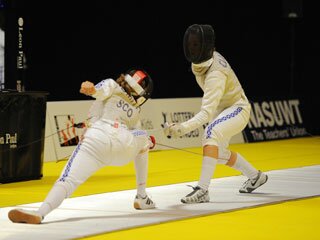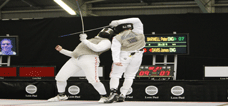
Originating as a way of settling disputes, Fencing has its roots in ancient sword fighting. There are 3 different types of weapons in fencing; the épée a sword similar to the duels of the 19th century, the foil, a thin flexible blade and the sabre, whose technique emphasizes speed and feints. Each weapon has its own associated scoring zone on the opponent's body and is played to a unique set of rules.
Many techniques of fencing are used for stunts and fight scenes in films; therefore fencing requires athletes to be quick and nimble. Mental skills are as crucial as physical ones with concentration and quick thinking being especially important.
Did you know...?
Alex O'Connell, one of only 3 Team GB fencing representative at the Beijing Olympics, has taken part in the UK School Games as a referee in 2007 and as an Athlete Ambassador in 2008.
Philip Marsh, the 2010 UK School Games Champion in Men's Epee went on to become Under 20 World Champion in 2011.
Ed Jefferies, World U20 silver medallist in 2009 and part of the London Olympic test event winning team in 2011, came 5th in the first UK School Games in 2006.
Four teams representing England, Northern Ireland, Scotland and Wales.
For information regarding the selection policy for Fencing at the Sainsbury's 2012 School Games, please contact Katie Dolan (British Fencing)




